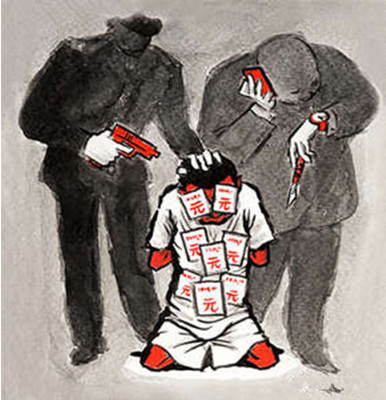器官移植
Spare the bullet
省子彈
Officials try to curb the use of organs from executed prisoners
官方喊停死囚器官移植
TRANSPLANT operations in China have long relied on organs taken from executed prisoners, a practice that has led to such abuses as the timing of executions to meet organ demand, with no notification of relatives. As by far the world's biggest user of the death penalty, China could count on an abundant—if still far from adequate—supply. But in recent years, stung by international criticism, it has been trying both to reduce executions and to end the harvesting of organs from executed prisoners without their, or their families', consent. Since January 1st the government has insisted that no such organs be used for transplants. Ensuring compliance, however, will be difficult.
中國的器官移植長時間以來都以死囚器官作為移植供體來源。什么時候需要器官就什么時候執行死刑,甚至來不及通知死囚家屬。作為目前為止世界上判處死刑最多的國家,中國有大量的器官供應,盡管依然不夠用。然而近年來,迫于國際譴責,中國開始減少死刑判決,同時也想結束未經過死囚家屬同意的器官移植。自從今年1月1日以來,政府表示再也沒有發生死囚器官移植。不過,要實現這個承諾,很難。

The number of executions is almost certainly falling, even if it remains far higher than in the rest of the world. The government does not release data, but the Dui Hua Foundation, an American NGO, reckons there were around 2,400 executions in 2013, down from 6,500 in 2007. In spite of the impact this has had on organ supply, the government still seems keen to sever the grim link between hospitals and courts that allows wealthy (or well-connected) patients to use organs from condemned prisoners. In theory, the rules mean that hospitals will be able to obtain only organs donated by volunteers to a national organ-bank.
即使中國仍然是判處死刑最多的國家,但它判處的死刑在不斷減少卻是不爭的事實。政府雖然沒有公布數據,不過美國的非政府組織對話基金估計2013年的死囚人數在2400左右,遠少于2007年的6500人。拋開對器官供應的影響,政府其實想要阻斷醫院和法院通過允許富人或名人接受囚犯器官移植收受利益。理論上,這條規定表明從今往后醫院的器官供體來源必須是中國人體器官捐獻管理中心的志愿捐贈者。
The bank was set up in 2010, partly to fight corruption in the organ-allocation system by making it less haphazard. It was slow to get going: by the end of 2014 it had received only about 8,000 organs from deceased volunteer-donors (it is not clear if this includes organs from executed prisoners; there is little incentive for court officials to force death-row inmates to give assent if the organs are given to a bank rather than to somebody willing to pay). But in January and February alone nearly 1,000 were donated, thanks to the linking of more provinces to the bank's network. The head of the government's organ-donation committee, Huang Jiefu, believes the bank will receive more than 10,000 organs this year. That is about as many as the number of transplants carried out annually, but a fraction of the 300,000 needed.
這個中心成立于2010年,設立的原因之一是為了打擊器官分配的腐敗。不過它起步很慢:直到2014年年末只收到了大約8000例來自病患的志愿捐贈(尚不清楚是否包含死刑犯;如果器官是給捐贈中心而不是給某個愿意出錢買的人的話,那么法官強迫死刑犯捐獻的動機將會消失)。不過得益于地方管理機構和捐贈中心之間建立的網絡,僅僅在一月和二月就有將近1000個器官被捐贈,黃潔夫,中國人體器官捐獻與移植委員會的主任委員,表示今年會受到超過10000例器官捐贈。這個數字與每年要進行的移植手術次數大致相當,不過對于300000的需求來說只是一小部分。
Persuading the public to donate remains a problem. Many Chinese adhere to a traditional belief that the body has to be kept intact to show respect for ancestors. A senior official at a provincial branch of the Red Cross Society of China, the agency responsible for the donor scheme, says that a lucrative backdoor trade in executed prisoners' organs will be hard to stop. He says hospitals, middlemen and court officials all benefit from it. They have often ignored a regulation passed in 2007 that requires consent from a deceased donor's family.
怎么勸說公眾來捐贈也是個問題。許多中國人都秉持著一個傳統。他們認為保有肉身完整才是對祖宗的尊重。一位來自中國地方紅十字會(負責捐贈事項)的高官表示死刑犯器官的黑色利益鏈條很難被打破。他說,醫院、中介和法院都從中獲利。所以他們選擇無視了2007年通過的一條法律--器官捐贈需征得病患家屬同意。
The government now appears to be suggesting it will get serious about a rule issued in 2013 which threatens hospitals with cancellation of their licences if they use organs other than those from the bank. One doctor says a small number of transplants performed at his hospital last year still involved prisoners' organs from outside the network. Mr Huang of the organ-donation committee admits that much work remains to be done.
政府如今似乎表態,他們將嚴格執行于2013年頒布的,關于醫院違規使用捐贈中心以外的器官將吊銷執照的法令。不過一名醫生透露去年他們醫院仍然有一小部分的器官移植手術用了不在范圍內的死囚器官。中國人體器官捐獻與移植委員會的黃潔夫承認想要真正禁止死囚器官移植,要走的路還很長。翻譯:張羽蔭












